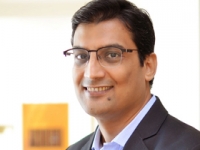At Cafemutual Confluence 2018, Navneet started with a key revelation that the India story is about corporate earnings growing at 16% CAGR and market cap growing at 15% CAGR while the GDP grew at 13% CAGR. Shunning changing political landscape in India, he adds that India has achieved this growth across different political regimes.
Continuing to talk about the India growth story, he said, India is on its way to become the third largest economy in the world in the next decade. Currently our per capita GDP stands at a measly US$ 2000. However, we need to remember that many of the world’s largest economies were at similar levels a few decades ago. Will we reach the levels of these economies in the next few years? Navneet believes we will and attributes it to four strong forces, which are at play - democracy, demography, demand and digitalisation.
The intermingling of these forces will help India become one of the strongest economies and create wealth for everyone.
Despite the rosy picture, he cautions investors that this progress comes with its own challenges. Not the typical cyclical challenges but broader ones. Here are a few challenges highlighted by Navneet in his presentation.
With 4% of the world’s land and water, supporting 18% of the world’s human population and cattle population India is already facing heightened water related stress. This is visible in the changing rainfall pattern, recent floods and rising sea levels.
Second, he mentions that 10 of the 20 most polluted cities are in India. This will add to our health related expenditures.
The third challenge is wealth concentration in hands of a few. On one hand, we have amongst the highest number of billionaires in the world and on the other hand, 21% of the population is below poverty line. This inequality may throw up many political challenges going forward. Thus, he encourages investors to look at the government’s efforts to build a social security net for the poorer sections in the society in a more favourable light.
Fourth, India has low expenditure on research and development (0.8% of GDP). He adds that the global economy is facing immense disruptions because of technology. Giving example of the top 500 companies in India, he shares that their total R&D expenditure is a fraction of Samsung’s R&D expenditure. If India wants to effectively tackle the challenges and capitalise on available opportunities, we need to increase our investment in research and development.
Further, if we look at historical returns than we can see that majority of the investor returns have come from ‘beta’ that is markets and ‘alpha’ that is excess returns generated by fund manager only form a small portion of the investor returns. Thus, we need to ensure that the market returns increase because the society and economy is prospering. Harmful environmental and economic practices are likely to affect markets returns negatively over long term.
He then introduced the concept of sustainable investing as an investment method, which evaluates the environmental and social impact of a company’s business practices and its governance standards. He pegs these parameters as being at equal importance as a company’s financials. Talking about the recent news and government policies, which are increasingly focussing on better Environment, Social and Governance (ESG) practices, he added that one can ignore these ESG parameters at one’s own peril.
Citing examples of cement and banking sector, he noted that companies with better ESG scores have delivered better growth compared to the non-ESG company. He observed a similar outperformance trend in returns of Nifty ESG v/s Nifty 100 (10.34% outperformance between April’11 to September’18) and MSCI EM ESG v/s MSCI EM (53.89% outperformance between April’11 to September’18). Navneet expected this trend to get more pronounced going forward.
Navneet elaborated on various sustainable investing approaches:
- Excluding companies, sectors that are damaging for the environment, society or do not have robust governance practices.
- Bet on companies having high ESG ranking in an industry.
- Opt for impact investing where you will analyse the positive ESG impact of a company along with the financials.
According to Navneet, the way forward involves - Evaluating each company on ESG factors.
Engaging proactively with investee companies because as we grow larger we will not have the luxury of excluding non-ESG companies from the investment. Rather, he mentions that we would need to improve standards for all companies by engaging with them.
Finally, he said that we would need to integrate the ESG framework into the entire investment process. For this, active engagement amongst fund managers, government authorities, businesspersons, media and asset owners that is investors and distributors is necessary. He highlighted the need for active engagement as globally, the demand of asset owners to have investments in line with their value systems is pushing companies to adopt better ESG practices. However, as there is no such investor led push in India, all stakeholders need to come together to ensure that companies adopt better practices.
Navneet believes that in the coming years sustainable investing will grow exponentially as issues such as climate change will become more critical, the changing investor mind-set will also give a push to sustainable investing. To elaborate, millennials analyse brand proposition before taking purchase decision. In addition, improved data analytics and policy nudge will also help sustainable investing grow.
He concluded the presentation mentioning that in the next 100 years, companies, which will create value for investors, will look at triple bottom line that is people and planet along with profits.







